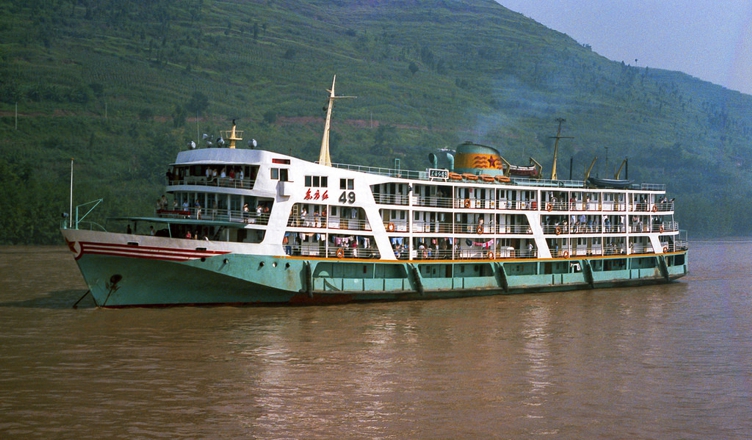A defining clash of attitudes, values and cultures, unreported in the media, plays out on the Yang-Tse river.
Unlike the gunboats of old and Apple-wielding businessmen of today, an American and an Australian travelling from a town closed to foreigners on a Chinese Yang-Tse riverboat in an auspicious year, the 35th anniversary of Mao’s China.
China had just begun to open its doors to foreign tourists. There were none of the modern skyscrapers, roads and fashion of today. Few facilities for tourists, except up-market hotels for westerners and modest hotels for groups of overseas Chinese visitors from Hong Kong and Taiwan. Outside of the major cities, people were unprepared for individual, off-the-beaten track travellers – especially, as it turned out, for us.
We slipped in by boat from Hong Kong to Shanghai and then by bus to the sacred mountain of Huang Shan. Up to that point, the trip had been defined by crowds of people gawking at us, the ringing of thousands of bicycle bells and our continuing ignorance at how far a small bribe could get us. Looking for something different, and to get away from the hordes of noisy tourists there, we didn’t climb that mountain, we instead left quickly by bus to go to Jiu Hua Shan.
Jiu Hua Shan was it, a beautiful place with many old Buddhist temples strung along a ridge line walking track. I remember vividly the smells of incense, the sounds of chanting and the blaring noise of speakers broadcasting throughout the valley, I assume the values of Chinese communist society.
We headed thereafter by bus over steep mountain roads to a small town on the Yang-tse where we hoped to stay and then take a boat to Wuhan. From that point on things took on an air of unreality. It was normal for the bus driver to turn off the engine going downhill to save on a bit of petrol. People in the small town were not prepared to let us stay in their hotel or even wander about – I think for the better and out of concern for us because I suspect it would have risked our health. A local official reminded us this was a closed town and had us wait for a riverboat that might be stopping there in the hours ahead. I laid on a terminal bench only to find later I had been bitten terribly by something all over my back.
We were exhausted, hungry and relieved to get on the riverboat after many hours of waiting. The boat had no first class, but started at second. We settled on third class beds in 8-to-a-cabin bunk beds. We were fortunate that an English-speaking fellow passenger kind-of looked after us. He explained to us that the second-class dining room was not for third class passengers, but nod-wink they expected foreigners to sneak in there.
Well, I considered myself a man of principle. My father worked in a factory all of his life and I had worked in politics only for people when I liked their views. So we told the translator that we would not sneak into that dining room because we weren’t entitled to use it. I also didn’t want to fit into whatever negative stereotype they might have of westerners. We said we would wait to eat in the cafeteria used by the rest of the passengers. Boat staff tried very hard to change our minds, but we wouldn’t budge. They finally said OK, but also said we would have to wait awhile.
Finally, starving, we were led downstairs to find that the entire room had been emptied. Inside was a single table with tablecloth and cutlery. Arrayed outside of the windows were dozens of other passengers gawking in at us. I felt so embarrassed. Our translator, who I believe was actually a Communist party official, joined us. After awhile a dish with the most amazing red fish was brought out to our table. And while food was put on our plate, no food was taken by the translator.
Just what message would be given or taken by us eating such a meal in that context? I am sure that food of that quality was not ever served in that cafeteria. I felt it would have been an insult to our hosts not to eat. Yet, I felt used by the translator/party official to have put us in such a position. So, I told the translator that we would not eat unless he ate with us. After going back and forth on that point for awhile, there was a tense silence. Finally, the translator, showing extreme discomfit, took the tiniest morsel and put it to his lips, but he ate no more. A powerful gesture to his wider audience. Then my friend and I ate what was probably one of the best meals we have ever had in China.
I am sure we did not meet their expectations of foreigners. And, we worked hard to ensure that we did not fit the stereotype of being foreign devils. I suspect and hope that, like ripples on a pond, the qualities we each showed as people had an impact far beyond the moment. Perhaps that translator has risen to be a top party official in their foreign ministry or just another fish from the Yang-tse! And, now you are reading this story here in this blog.
To me it goes to show that at every moment of our lives we have choices to make that have an impact on the lives and learning of other people. And don’t we all have stories to tell!
Image Copyright Iain Forbes (https://www.flickr.com/photos/67307569@N00/663112098/in/set-72157594277247701)






